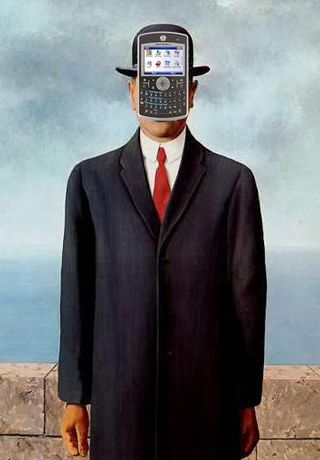

Here we have another WMExperts editorial that starts relatively small and ends up turning into a big ol' discussion of what a smartphone is and what it should be. Today's question: how does your identity define your smartphone and, more importantly, how does your smartphone define your identity? Here we go!
Darla Mack asks the following question: (trackback here)
Men think that women want pink phones and cute phone charms and such. Women think that men want to have the “biggest, first, most expensive, etc. etc.”. But does anyone really know?In my mobile journeys I've found that women do in fact want the same as men.
I'm inclined to agree -- the idea that you can slap a pink cover on a gadget and call it “female-friendly” is more than a little silly. It might be slightly less silly to argue that a given operating system's interface is “gendered,” though. I'm far from an expert on questions of gender and find the whole thing somewhat difficult to talk about (more on that in a moment).
It's more than just gender, though, there's a whole swath of people worldwide that don't seem to be getting properly addressed by the way smartphones get marketed these days. Can Microsoft (et al) find a way to direct their development and their marketing to address the needs and desires of different demographics without pandering or stereotyping?
I don't know, but I have a few thoughts. Read on!
Are Smartphones Gendered?
The default assumption, I'm guessing, is that Windows Mobile is too analytical/left brained overall and therefore oriented towards the typically male way of thinking about the world. All those regimented menus, submenus, lines, squares, checkboxes... it all seems to read decided “male.”
The numbers bear that reading out, as we reported last November:
Get the Windows Central Newsletter
All the latest news, reviews, and guides for Windows and Xbox diehards.
According to a recent research by Microsoft, only 14.6% of the Windows Mobile users are women, compared with 85.4% of men.
I doubt that the divide is as stark as that for all smartphones, but at the recent BlackBerry WES 2008 conference I heard the same refrain from the few women I spoke with: “I wish there were more women here and in this industry.” There's definitely a problem here: Smartphones seem to be designed by men and for men.
I mentioned that talking about different demographics and the needs of those demographics is a little difficult to talk about. Here's why: While it's clear that smartphones are primarily designed by men and (for now, anyway) primarily used by men, it's much less clear that smartphones are “gendered.”
I have argued before that while Windows Mobile is not intuitive in a basic “I just get it / lizard brain” sense, it can be intuitive in a “Now I understand the metaphors for how this works” sense. Just as a manual transmission car isn't intuitive at all, it can still become “intuitive” to a frequent user (or, in smartphone parlance, a “power user”).
Take the earlier list of the things that are purportedly 'male' about the Windows Mobile interface. Are all those lines and checkboxes and questions of memory management and registry edits more intuitive to a male brain than to a female? Many would probably argue yes. I think that I would argue it's much more complicated.
I also think that Mack might agree, she writes:
We may take a back seat to being a mobile front runner when it comes to dropping bucks but that doesn't mean that we aren't technologically equipped to know a powerful device when we see it.
The line between “how a male brain works” and “how a female brain works” is movable, fluid, and fuzzy at best. Is “left brained” as “typically male” as we think it is? Frankly, no. The inverse also applies.
Since I'm no longer the academic I once was (and wasn't much of one even then), I can't name off the various studies about gendered interfaces, but they exist and they're a hell of a lot more nuanced than what you're reading here. Trust me - start digging into the concept of the “Cyborg” and you'll find enough material to set yourself up with complex and interesting reading for life.
So with Windows Mobile, while there seems to be evidence for it being 'gendered' based on who's making it and who's using it, trying to actually pin down the 'gendered elements' of the OS with any kind of accuracy and without blatant stereotyping is a task that's pretty much impossible to tackle.
Instead I think Microsoft ought to try to just make the interface more “lizard brain intuitive” than it is now -- more automatic transmission than manual transmission. As they do it, though, they ought to at least be aware of what their concept of “lizard brain” intuition is -- that concept needs to be much, much larger than upper-middle-class-white-male-executive-with-money-to-burn.
A Global Understanding of Who a Smartphone User is and Can Be
Saying that the target market is “upper-middle-class-white-male-executive-with-money-to-burn” may sound harsh, but the data bears it out. Gartner just released a study last month saying as much:
Sixty-eight percent of the world’s population is women and children who could benefit much from mobile technology, but the majority of mobile devices are designed by men, for men, according to Gartner, Inc. The user profile to which most mobile products are targeted is a western adult male (age 20 to 64), but this represents just 32 percent of the global population.
As I attended SOFCON 2008: The Mobile Future Conference last month, I heard the same thing over and over again: the internet is going mobile and phones are becoming more important than computers.
As people described this issue it became clear it was more than just a catchy marketing phrase (though, yes, it was that too): in the very very near future more people will be accessing the internet on cell phones than do on computers. Accessing it for the first time and nearly every time via a cell phone. The cell phone is literally going to be how the vast people understand and interact with the internet.
People might get excited by the One Laptop Per Child project, but that's nothing compared to the cellphone.
A cell phone is power, it is in an increasingly real sense a cornerstone of modern identity. Who I am is as much my phone number and email address as it is my name and physical address. Imagine having a very close friend of yours who doesn't have an email address, or a voicemail box, or -- yes -- a telephone. Barring snail mail, there would be no way to communicate with this person unless you were in person. This disconnected person would seem like a ghost, adrift in a world of connected nodes of communication, a neuron without a synapse. Where would he or she speak from or be spoken to except their physical place? Nowhere -- and as physical place becomes less important being disconnected make you more ghostlike.
This still describes the majority of people on the planet, but that's changing and changing rapidly. What companies like Microsoft and Nokia and RIM and Apple and Palm should be thinking about is much much more important than who has the most market share in North America:
- What does it mean to make a smartphone that is a person's sole means of interacting with the larger world?
- What does the internet look like when seen only through the screen on a smartphone?
- What kind of smartphone do you need to make when it's the only means of communication for an entire family? An entire village?
...and most importantly:
What does it mean not only to supply somebody with a smartphone, but to supply them with an identity?
I don't know the answer to these questions, but they are the real stakes of the smartphone market. If you're in the business of providing tools that give people a “21st Century Identity,” you better be damn sure that it's not limited by a gendered way of thinking, a “western” way of thinking, or whatever superstructure you want. You had better do your best to design it to free people's minds instead of limit them.
In a couple hundred years I'm confident that the smartphone will be considered just as important as the PC as or as the Internet in terms of how it changed the world. It will be the primary 'PC experience' and the primary 'internet experience' for the vast majority of the planet. It's a revolution of technology and of identity. I know that people who work on creating smartphones are beginning to think of them this way, we as users should do the same.

